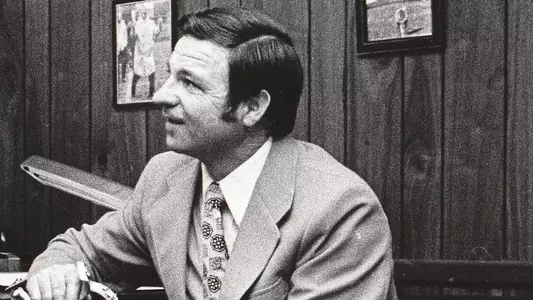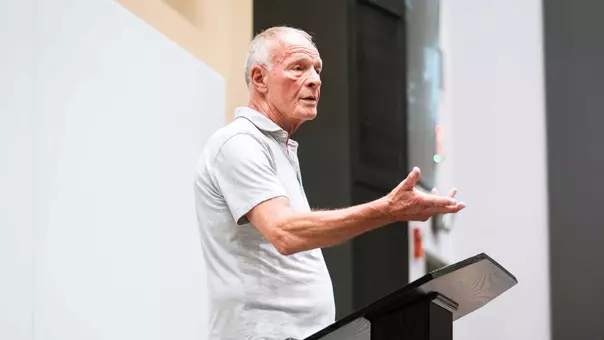
Culture Setter: Wake Forest University Leadership Committed to Supporting Integration of Athletics
7/29/2021 8:00:00 AM | General
President Harold Tribble, AD Gene Hooks and head coach Bill Tate were committed to Wake Forest becoming the first school to integrate intercollegiate athletics in the south and they supported the student-athletes and each other.
WINSTON-SALEM, N.C. -- Dr. Gene Hooks did not exactly ease into his new role at Wake Forest as the school's fourth director of athletics when he was hired in 1964. Instead he worked with University President, Dr. Harold Tribble, and first-year football coach Bill Tate to become the first football program in the south to integrate. That summer and fall brought three young men, Robert Grant, Kenneth "Butch"Henry and Willie Smith to Winston-Salem.
"Coach Tate was determined to have Black players in his program," Hooks said. "He was willing to take it on the chin, and I was willing to support him."
Hooks still remembers a Raleigh-area Deacon Club meeting where Tate was asked derisively about his decision to bring Black athletes onto the football team.
"Bill didn't back down one bit," Hooks said.
Of course, the next day Tate's comments ran in the News & Observer. He was quoted as saying the Demon Deacons were going to recruit Black football players and if nobody else did that would help Wake Forest become that much more successful.
Hooks met with both Grant and Henry when they visited campus on their respective recruiting visits.
"I did not know much about them, but the more I found out about them, the more I liked them," he said. "If there was one word to describe them, it would be class. They were both class acts. Good students, great players and good teammates. They fit what I would like Wake Forest athletes to be. They were easy to defend and help out as pioneers could be."
Although he knows the two had to overcome significant obstacles to break through and succeed at Wake Forest, Hooks himself faced very little resistance to the move on campus.
"Bill Tate was committed to it and I was committed to supporting him in trying to have a good football program," he said. "I was not neutral on it. I was committed to recruiting them and supporting these student-athletes to not allow them to have a bad experience. If anybody objected to it, I just told them this is the way it is, and that this is what Wake Forest is all about.
"Dr. Tribble was committed to it, just like I was. He was supporting me, just like I was supporting Coach Tate and the players. He was not embarrassed by it and did not make excuses for it. It was part of our growing up as a University, really."
There was also no pushback from other ACC athletic directors, even those who hadn't yet made a similar progressive decision.
"I was 33 years old and had never been an administrator or athletic director," Hooks said. "I did not know a single one of them before I became an athletic director. I'd been a baseball coach for three years, and baseball coaches and athletic directors don't mix very often. I got no negative feedback from any of the other athletic directors at all."
Hooks was impressed by the football ability displayed by Grant, who ended up being selected in the second round of the 1968 NFL Draft to start his four-year professional football career. Both Grant and Henry made a positive impression on campus.
"The first day they walked on campus," Hooks said when asked when he knew it was going to work out. "There was never any problem. I don't remember a single incident."
While Grant and Henry are now being recognized for being trailblazers for what they accomplished by helping integrate college football in the south, Grant heaps a ton of credit on the Wake Forest administration during that era.
"Can you imagine the courage it took for Dr. Tribble, the president of the school at that time, along with Gene Hooks, who was the new athletics director, with Coach Bill Tate, in the South?" he asked. "At that time? In 1964? You never hear those three white men's names mentioned in regards to advances in Civil Rights during that era in the United States. You never even hear their names associated with it, but look at what they did. They made the decision."
"Coach Tate was determined to have Black players in his program," Hooks said. "He was willing to take it on the chin, and I was willing to support him."
Hooks still remembers a Raleigh-area Deacon Club meeting where Tate was asked derisively about his decision to bring Black athletes onto the football team.
"Bill didn't back down one bit," Hooks said.
Of course, the next day Tate's comments ran in the News & Observer. He was quoted as saying the Demon Deacons were going to recruit Black football players and if nobody else did that would help Wake Forest become that much more successful.
Hooks met with both Grant and Henry when they visited campus on their respective recruiting visits.
"I did not know much about them, but the more I found out about them, the more I liked them," he said. "If there was one word to describe them, it would be class. They were both class acts. Good students, great players and good teammates. They fit what I would like Wake Forest athletes to be. They were easy to defend and help out as pioneers could be."
Although he knows the two had to overcome significant obstacles to break through and succeed at Wake Forest, Hooks himself faced very little resistance to the move on campus.
"Bill Tate was committed to it and I was committed to supporting him in trying to have a good football program," he said. "I was not neutral on it. I was committed to recruiting them and supporting these student-athletes to not allow them to have a bad experience. If anybody objected to it, I just told them this is the way it is, and that this is what Wake Forest is all about.
"Dr. Tribble was committed to it, just like I was. He was supporting me, just like I was supporting Coach Tate and the players. He was not embarrassed by it and did not make excuses for it. It was part of our growing up as a University, really."
There was also no pushback from other ACC athletic directors, even those who hadn't yet made a similar progressive decision.
"I was 33 years old and had never been an administrator or athletic director," Hooks said. "I did not know a single one of them before I became an athletic director. I'd been a baseball coach for three years, and baseball coaches and athletic directors don't mix very often. I got no negative feedback from any of the other athletic directors at all."
Hooks was impressed by the football ability displayed by Grant, who ended up being selected in the second round of the 1968 NFL Draft to start his four-year professional football career. Both Grant and Henry made a positive impression on campus.
"The first day they walked on campus," Hooks said when asked when he knew it was going to work out. "There was never any problem. I don't remember a single incident."
While Grant and Henry are now being recognized for being trailblazers for what they accomplished by helping integrate college football in the south, Grant heaps a ton of credit on the Wake Forest administration during that era.
"Can you imagine the courage it took for Dr. Tribble, the president of the school at that time, along with Gene Hooks, who was the new athletics director, with Coach Bill Tate, in the South?" he asked. "At that time? In 1964? You never hear those three white men's names mentioned in regards to advances in Civil Rights during that era in the United States. You never even hear their names associated with it, but look at what they did. They made the decision."
2025 Moffitt Ceremony
Wednesday, December 10
Wake Forest Head Coach Jake Dickert National Signing Day Press Conference
Thursday, December 04
Dec. 3, 2025: Coach Jake Dickert National Signing Day Press Conference
Wednesday, December 03
Steve Forbes Postgame Presser vs. Oklahoma
Wednesday, December 03



